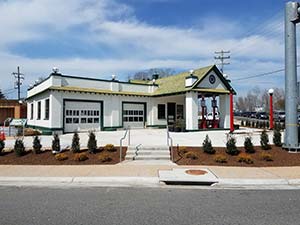The following is a guest blog by Jessica Taylor, doctoral candidate at University of Florida, and Lead Interviewer on our project to record oral histories about the Edge Hill Service Station and Gloucester’s Main Street community.
As easy as it is to have a conversation about the old days over dinner, the prospect of doing an oral history across the table from a friendly college student makes some people incredibly uncomfortable. Many are uncertain if they are doing it “right.” After finishing an answer, interviewees often ask me questions like “What do you think of that?” Others frankly say, “I’m running out of information to tell you,” or lament that “I don’t have many stories, but my father, he could have told you a lot of things.”
Every time, I wish I could stop the recorder and say, “I think it’s great. Everything you’re saying is made of solid gold.” Most crucially, I would add, “You have more interesting information to give than you think you do.” And it’s not just true of a select few; it’s true of every single person, young and old, of all walks of life.
Here’s the reason: you, potential informant, are the most interesting person in the world. You are the combination of experience, family, carefully cultivated skill sets and talents, a sense of place and time, and there is no one else exactly like you. I’m just trying to understand what makes you the person that you are and how you came to be that way.
John came to the store all scratched up.
“John! What happened?”
He said, “I was walking down the road and I came by Friends’ Church and Poison Jenny came out the bushes and put a spell on me. And she put a saddle on me and put a bridle on me with a bit in my mouth and rode me through the blackberry briars. And that’s how come I’m all scratched up. Because Poison Jenny rode me through the blackberry briars.”
In the same way, we contextualize the present by referring and comparing it to the past as we remember it. It is how we make sense of the changes in our lives, and we might feel nostalgic, reverent, bitter, optimistic, or even relieved. Mrs. Emory said of modern Gloucester Point that “it’s so many more houses, it’s so many more people…it’s a lot of things to deal with that I did not have to deal with as much. Practically we were all neighbors as that goes.” Hollis Pruitt from White Marsh referred to visiting colonial ruins as “walking on sacred ground.” Wray Page, in his characteristically stoic and dignified way, said simply that “the twentieth century didn’t make much difference.”
Why do they feel so differently? Because Mrs. Emory’s children moved away like many young people, to seek work outside of the county. Mr. Pruitt sees plantation landscapes as an essential part of the history of black Gloucester residents, and Wray Page found meaning despite hardships in the centuries of Gloucester heritage that belong to the Page family.
Mr. Hogge from Bena said of Gloucester that “there’s good ones and there’s bad ones, and we’re all growed up together.” Individually, even sentences from hour-long interviews are spilling over with the essence of who you are and where you’re from. Imagine the stories we can make together, just with five or ten or twenty interviews. Your stories, your memories, your perspective, will help us understand the full spectrum of everyday life in Gloucester.
I look forward to speaking with you in person.

